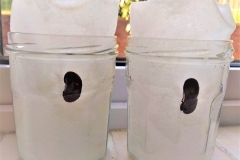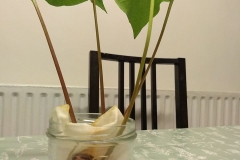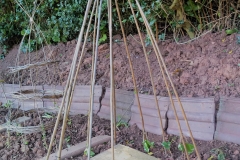
When Promises are Broken
During this time of social distancing and self-isolation, I have had to break a number of commitments made to others. Visits I’ve been looking forward to have been postponed indefinitely.
Everyone understands why though. Relationships remain intact – from a distance.
Have you ever broken a commitment to someone? Was it easy to explain? Or did it leave the relationship tense and in jeopardy?
When someone breaks their promise, it hurts. Small promises that are broken we can easily forgive, but bigger promises, if broken, can destroy a relationship.
In my last two blogs, I have focused on a story about a covenant (an important and binding promise) between God and Abraham.
Abraham starts to have doubts about his calling. In response, God tells him to find a number of animals to be sacrificed and displayed in formation. This may seem like an odd command, but a little ancient history sheds light on this custom.
These days, when we formalise an agreement, or an important promise between two parties, we usually sign contracts. The contract might say that if one party fails to keep their agreement, they will be subject to a fine and/or the deal is off.
There are documents that have been found, from ancient cultures, in Abraham’s day, that describe the custom at the time for formalising covenants.[1] The two parties would sacrifice animals and cut them in half. They would then both walk between the animal carcasses. In doing so they were invoking a curse on themselves, effectively saying “if I break my promise, let me be dead like this animal.”
Abraham understood God wanted to formalise and confirm his promises, so he set to work, and what hard work it was. He cut the animals and lay them out, then chased away birds of prey till sunset.
A deep sleep falls on Abraham and God confirms his promises to him, explaining how and when they will come about. Then Abraham has a vision.
Abraham sees a smoking fire pot and a flaming torch pass between the pieces of cut animals.
In other passages in the Bible, it is evident that smoke and fire represent the very presence of God. For example, in Exodus 3:2-4, God appears to Moses in a burning bush. In Exodus 19:18, we read that when God appears to Moses on Mount Sinai, the whole mountain is enveloped in smoke and fire.
So it seems that God himself was stepping down into the blood soaked desert, between the animal carcasses, to assure Abraham of his promises.
But where was Abraham?
In normal covenant-making, both parties would walk between the pieces and invoke the curse on themselves. But, in Abraham’s vision, only God passes through the pieces.
God was doing something that no rational person ever would. He was saying, I will pay the price of death whether you or I break our promise.[2] The promise depended only on God’s faithfulness, grace and power. Not on Abraham and his descendants’ ability to obey God.
In that moment, creator God committed himself to dying on the cross.
God never breaks a promise. Abraham had a son. His descendants grew into a large nation, and in the book of Joshua we read they were given the land that had been promised to them.
However, in Genesis 20:2-3 we read how Abraham lied about his wife, saying she was only his sister, allowing other men to try to take her for their own wife. Abraham was not able to keep his part of the covenant-promise, which was to be holy. And many of his descendants after him failed too.
The truth is none of us are able to keep all of our commitments to God. We have all said and done hurtful things; we have broken promises.
Our broken promises matter to God. They damage our relationship with him, just as our own relationships are affected, when we break promises to each other.
But God, in his grace and love, keeps his promises to us, regardless of our continual failures. His promises to us are secure because he has already shouldered the cost of our failures – by coming to us as a man, Jesus, and dying on the cross. All we need to do is look in faith to that cross and our relationship with God will be restored.
In this time of pandemic, with our movements restricted, how wonderful it is that God’s promises to us are secured by what he has done, not what we are able to do.
Bean Tepee
It is spring time, so if you find yourself confined to the house more than you’d like to be while we face the spread of Covid-19, why not take the time to grow some veggies in your house or garden?
It is also a great home school project to do with kids and if you’re able to make a tepee it makes a great den for toddlers.
- Place a folded piece of kitchen roll around the inside of a couple of glass jars and dampen it carefully.
- Place three runner bean seeds around each jar between the glass and the kitchen roll.
- Keep the kitchen roll damp and in a few days you will begin to see roots emerge from the seed. This is great for young children to see the stages of germination.
- When the stem and leaves begin to appear, allow them to grow to around 5 inches before planting out.
- Prepare an area of ground that gets at least 6 hours full sun, by digging to loosen the soil and removing any weeds.
- Insert bean poles in a tepee formation and tie with string at the top to provide stability.
- Plant the beans next to each bean pole and very gently guide the bean plant around the pole. (Plant out at the end of April when there is no longer a risk of frost and keep the plants watered, especially when they go into flower).
[1] There is an excellent and accessible set of Bible commentaries titled ‘The NIV Application Commentary’. In the book on Genesis, J. Walton indicates there are documents from the ancient city-state Alalakh and the ancient city Mari (now in modern day Syria) that describe the custom of killing and cutting animals into parts, then walking between the parts.
[2] ‘Kingdom through Covenant,’ by P. Gentry and S. Wellum is a book I would highly recommend if you are interested in the covenants through the Bible. In it they quote from Ray Vander Laan to support this conclusion as to why only God was seen passing through the pieces of dead animal.


